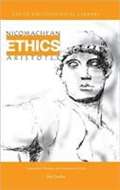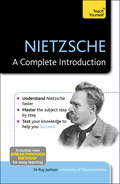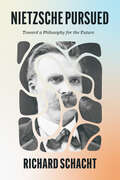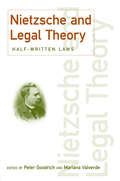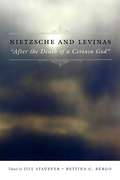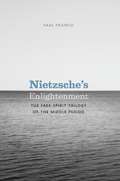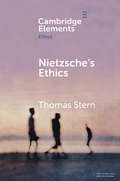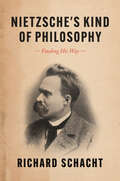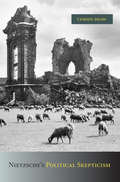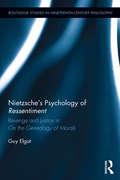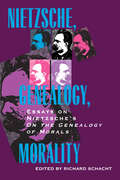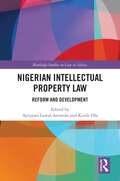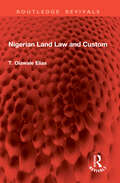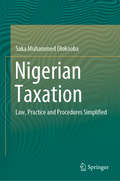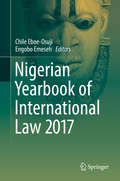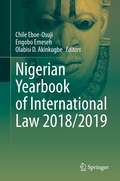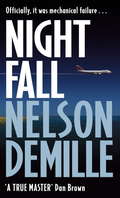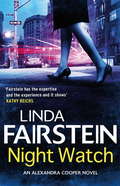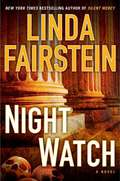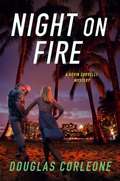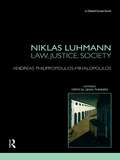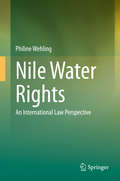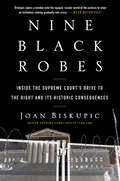- Table View
- List View
Nicomachean Ethics: Translation, Glossary, and Introductory Essay
by Aristotle Terence Irwin Joe SachsFocus Philosophical Library's edition of Aristotle's Nicomachean Ethics is a lucid and useful translation of one of Aristotle's major works for the student of undergraduate philosophy, as well as for the general reader interested in the major works of western civilization. This edition includes notes and a glossary, intending to provide the reader with some sense of the terms and the concepts as they were understood by Aristotle's immediate audience. Focus Philosophical Library books are distinguished by their commitment to faithful, clear, and consistent translations of texts and the rich world part and parcel of those texts.
Nietzsche - A Complete Introduction: Teach Yourself
by Roy JacksonWritten by Dr Roy Jackson, who is Course Leader in Religion, Philosophy and Ethics at the University of Gloucestershire, Nietzsche: A Complete Introduction is designed to give you everything you need to succeed, all in one place. It covers the key areas that students are expected to be confident in, outlining the basics in clear jargon-free English, and then providing added-value features like summaries of key books, and even lists of questions you might be asked in your seminar or exam. The book uses a structure that mirrors the way Nietzsche is studied on many university courses, with chapters looking at Nietzsche's life, The Birth of Tragedy, the revaluation of all values, the will to power, Thus Spoke Zarathustra, truth and perspectivism, religion, politics, and Nietsche's legacy
Nietzsche Pursued: Toward a Philosophy for the Future
by Richard SchachtAn ambitious venture into Nietzsche’s envisioned philosophy for the future. Nietzsche advocated for a post-theistic “philosophy of the future”—a new approach to human reality that would bend Western thought away from nihilism in a life-affirming, value-creative direction. His early demise left this endeavor only just begun. In Nietzsche Pursued, Richard Schacht examines Nietzsche’s revisionist approach to familiar philosophical topics, exploring how some may be further pursued in Nietzschean ways. Each chapter focuses on one topic that is central to Nietzsche's vision of what philosophy can and should be and do. Among them: his kind of naturalism, humanity, perspectivism, morality, and music. Building on his analysis in Nietzsche’s Kind of Philosophy, Schacht invites readers to see with new appreciation the ongoing significance of Nietzsche’s thought for philosophy’s future.
Nietzsche and Legal Theory: Half-Written Laws (Discourses Of Law Ser.)
by Mariana Valverde Peter GoodrichNietzsche and Legal Theory is an anthology designed to provide legal and socio-legal scholars with a sense of the very wide range of projects and questions in whose pursuit Nietzsche's work can be useful. From medical ethics to criminology, from the systemic anti-Semitism of legal codes arising in Christian cultures, to the details of intellectual property debates about regulating the use of culturally significant objects, the contributors (from the fields of law, philosophy, criminology, cultural studies, and literary studies) demonstrate and enact the sort of creativity that Nietzsche associated with the "free-spirits" to whom he addressed some of his most significant work.
Nietzsche and Levinas: "After the Death of a Certain God" (Insurrections: Critical Studies In Religion, Politics and Culture)
by Bettina Bergo Jill StaufferThe essays that Jill Stauffer and Bettina Bergo collect in this volume locate multiple affinities between the philosophies of Nietzsche and Levinas. Both philosophers question the nature of subjectivity and the meaning of responsibility after the "death of God." While Nietzsche poses the dilemmas of a self without a ground and of ethics at a time of cultural upheaval and demystification, Levinas wrestles with subjectivity and the sheer possibility of ethics after the Shoah. Both argue that goodness exists independently of calculative reason-for Nietzsche, goodness arises in a creative act moving beyond reaction and ressentiment; Levinas argues that goodness occurs in a spontaneous response to another person. In a world at once without God and haunted by multiple divinities, Nietzsche and Levinas reject transcendental foundations for politics and work toward an alternative vision encompassing a positive sense of creation, a complex fraternity or friendship, and rival notions of responsibility.Stauffer and Bergo group arguments around the following debates, which are far from settled: What is the reevaluation of ethics (and life) that Nietzsche and Levinas propose, and what does this imply for politics and sociality? What is a human subject-and what are substance, permanence, causality, and identity, whether social or ethical-in the wake of the demise of God as the highest being and the foundation of what is stable in existence? Finally, how can a "God" still inhabit philosophy, and what sort of name is this in the thought of Nietzsche and Levinas?
Nietzsche's Enlightenment
by Paul FrancoWhile much attention has been lavished on Friedrich Nietzsche's earlier and later works, those of his so-called middle period have been generally neglected, perhaps because of their aphoristic style or perhaps because they are perceived to be inconsistent with the rest of his thought. With Nietzsche's Enlightenment, Paul Franco gives this crucial section of Nietzsche's oeuvre its due, offering a thoughtful analysis of the three works that make up the philosopher's middle period: Human, All too Human; Daybreak; and The Gay Science. It is Nietzsche himself who suggests that these works are connected, saying that their "common goal is to erect a new image and ideal of the free spirit. " Franco argues that in their more favorable attitude toward reason, science, and the Enlightenment, these works mark a sharp departure from Nietzsche's earlier, more romantic writings and differ in important ways from his later, more prophetic writings, beginning with Thus Spoke Zarathustra. The Nietzsche these works reveal is radically different from the popular image of him and even from the Nietzsche depicted in much of the secondary literature; they reveal a rational Nietzsche, one who preaches moderation instead of passionate excess and Dionysian frenzy. Franco concludes with a wide-ranging examination of Nietzsche's later works, tracking not only how his outlook changes from the middle period to the later but also how his commitment to reason and intellectual honesty in his middle works continues to inform his final writings.
Nietzsche's Enlightenment: The Free-Spirit Trilogy of the Middle Period
by Paul FrancoWhile much attention has been lavished on Friedrich Nietzsche’s earlier and later works, those of his so-called middle period have been generally neglected, perhaps because of their aphoristic style or perhaps because they are perceived to be inconsistent with the rest of his thought. With Nietzsche’s Enlightenment, Paul Franco gives this crucial section of Nietzsche’s oeuvre its due, offering a thoughtful analysis of the three works that make up the philosopher’s middle period: Human, All too Human; Daybreak; and The Gay Science. It is Nietzsche himself who suggests that these works are connected, saying that their “common goal is to erect a new image and ideal of the free spirit.” Franco argues that in their more favorable attitude toward reason, science, and the Enlightenment, these works mark a sharp departure from Nietzsche’s earlier, more romantic writings and differ in important ways from his later, more prophetic writings, beginning with Thus Spoke Zarathustra. The Nietzsche these works reveal is radically different from the popular image of him and even from the Nietzsche depicted in much of the secondary literature; they reveal a rational Nietzsche, one who preaches moderation instead of passionate excess and Dionysian frenzy. Franco concludes with a wide-ranging examination of Nietzsche’s later works, tracking not only how his outlook changes from the middle period to the later but also how his commitment to reason and intellectual honesty in his middle works continues to inform his final writings.
Nietzsche's Ethics (Elements in Ethics)
by Thomas SternThis Element explains Nietzsche's ethics in his late works, from 1886 onwards. The first three sections explain the basics of his ethical theory – its context and presuppositions, its scope and its central tension. The next three sections explore Nietzsche's goals in writing a history of Christian morality (On the Genealogy of Morality), the content of that history, and whether he achieves his goals. The last two sections take a broader look, respectively, at Nietzsche's wider philosophy in light of his ethics and at the prospects for a Nietzschean ethics after Nietzsche.
Nietzsche's Kind of Philosophy: Finding His Way
by Richard SchachtA holistic reading of Nietzsche’s distinctive thought beyond the “death of God.” In Nietzsche’s Kind of Philosophy, Richard Schacht provides a holistic interpretation of Friedrich Nietzsche’s distinctive thinking, developed over decades of engagement with the philosopher’s work. For Schacht, Nietzsche’s overarching project is to envision a “philosophy of the future” attuned to new challenges facing Western humanity after the “death of God,” when monotheism no longer anchors our understanding of ourselves and our world. Schacht traces the developmental arc of Nietzsche’s philosophical efforts across Human, All Too Human, Daybreak, Joyful Knowing (The Gay Science), Thus Spoke Zarathustra, Beyond Good and Evil, and On the Genealogy of Morality. He then shows how familiar labels for Nietzsche—nihilist, existentialist, individualist, free spirit, and naturalist—prove insufficient individually but fruitful if refined and taken together. The result is an expansive account of Nietzsche’s kind of philosophy.
Nietzsche's Political Skepticism
by Tamsin ShawPolitical theorists have long been frustrated by Nietzsche's work. Although he develops profound critiques of morality, culture, and religion, it is very difficult to spell out the precise political implications of his insights. He himself never did so in any systematic way. In this book, Tamsin Shaw claims that there is a reason for this: Nietzsche's insights entail a distinctive form of political skepticism. Shaw argues that the modern political predicament, for Nietzsche, is shaped by two important historical phenomena. The first is secularization, or the erosion of religious belief, and the fragmentation of moral life that it entails. The second is the unparalleled ideological power of the modern state. The promotion of Nietzsche's own values, Shaw insists, requires resistance to state ideology. But Nietzsche cannot envisage how these values might themselves provide a stable basis for political authority; this is because secular societies, lacking recognized normative expertise, also lack a reliable mechanism for making moral insight politically effective. In grappling with this predicament, Shaw claims, Nietzsche raises profound questions about political legitimacy and political authority in the modern world.
Nietzsche's Psychology of Ressentiment: Revenge and Justice in "On the Genealogy of Morals" (Routledge Studies in Nineteenth-Century Philosophy)
by Guy ElgatRessentiment—the hateful desire for revenge—plays a pivotal role in Nietzsche’s On the Genealogy of Morals. Ressentiment explains the formation of bad conscience, guilt, asceticism, and, most importantly, it motivates the "slave revolt" that gives rise to Western morality’s values. Ressentiment, however, has not enjoyed a thorough treatment in the secondary literature. This book brings it sharply into focus and provides the first detailed examination of Nietzsche’s psychology of ressentiment. Unlike other books on the Genealogy, it uses ressentiment as a key to the Genealogy and focuses on the intriguing relationship between ressentiment and justice. It shows how ressentiment, despite its blindness to justice, gives rise to moral justice—the central target of Nietzsche’s critique. This critique notwithstanding, the Genealogy shows Nietzsche’s enduring commitment to the virtue of non-moral justice: a commitment that grounds his provocative view that moral justice spells the ‘end of justice’. The result provides a novel view of Nietzsche's moral psychology in the Genealogy, his critique of morality, and his views on justice.
Nietzsche, Genealogy, Morality: Essays on Nietzsche's <i>On the Genealogy of Morals</i> (Philosophical Traditions #5)
by Richard SchachtWritten at the height of the philosopher's intellectual powers, Friedrich Nietzsche's On the Genealogy of Morals has become one of the key texts of recent Western philosophy. Its essayistic style affords a unique opportunity to observe many of Nietzsche's persisting concerns coming together in an illuminating constellation. A profound influence on psychoanalysis, antihistoricism, and poststructuralism and an abiding challenge to ethical theory, Nietzsche's book addresses many of the major philosophical problems and possibilities of modernity.In this unique collection focusing on the Genealogy, twenty-five notable philosophers offer diverse discussions of the book's central themes and concepts. They explore such notions as ressentiment, asceticism, "slave" and "master" moralities, and what Nietzsche calls "genealogy" and its relation to other forms of inquiry in his work. The book presents a cross section of contemporary Nietzsche scholarship and philosophical investigation that is certain to interest philosophers, intellectual and cultural historians, and anyone concerned with one of the master thinkers of the modern age.
Nietzsche: A Complete Introduction: Teach Yourself
by Roy JacksonWritten by Dr Roy Jackson, who is Course Leader in Religion, Philosophy and Ethics at the University of Gloucestershire, Nietzsche: A Complete Introduction is designed to give you everything you need to succeed, all in one place. It covers the key areas that students are expected to be confident in, outlining the basics in clear jargon-free English, and then providing added-value features like summaries of key books, and even lists of questions you might be asked in your seminar or exam.The book uses a structure that mirrors the way Nietzsche is studied on many university courses, with chapters looking at Nietzsche's life, The Birth of Tragedy, the revaluation of all values, the will to power, Thus Spoke Zarathustra, truth and perspectivism, religion, politics, and Nietsche's legacy.
Nigerian Intellectual Property Law: Reform and Development (Routledge Studies on Law in Africa)
by Ayoyemi Lawal-ArowoloThis book reflects on the development of Nigeria’s intellectual property law and outlines the urgent need for reform. Bringing together expert contributors from around the world, the book identifies and discusses the inadequacies and lacunas in current intellectual property law, and how it is practiced and applied in Nigeria. The book argues that the revision and reform of Nigeria’s intellectual property law will be vital for the country’s development and national interests, whilst also recognising that Nigeria’s legal provisions must sit within a broader global context. Divided into three parts, the book discusses patents, trademarks, and copyright in the context of broad overarching themes affecting all aspects of intellectual property law. Honouring Professor Adebambo Adewopo SAN, the pioneering thinker in Nigerian intellectual property law, this book will be an important resource for researchers working on African Law.
Nigerian Land Law and Custom (Routledge Revivals)
by T. Olawale EliasOriginally published in 1951, Nigerian Land Law and Custom (now with a new preface by Olusoji Elias), the first of its kind, is an excellent comparative study of the whole system of land tenure in Nigeria. There are, of course, a few anthropological attempts, almost invariably designed as or inspired by Government Reports on some specific areas of the country, and their aim is therefore often administrative or fiscal. This book is accordingly an attempt to create a legal order out of the chaos of lay approaches and to examine and systematize, as far as possible, such principles of indigenous tenure as are discernible in available materials in the light of the growing body of case-law.This book will be of value to students and researchers of African law and custom, and of comparative jurisprudence.
Nigerian Taxation: Law, Practice and Procedures Simplified (SpringerBriefs in Law)
by Saka Muhammed OlokoobaThis book offers a simplified and straightforward introduction to the basics of Nigerian taxation. While discussing various laws, practices and procedures, it also addresses the latest amendments to Nigerian tax laws. The book begins by discussing the central issue of Islamic taxation and its legality under Nigerian law. Divided into four main sections, the book was designed for simplicity, and uses language that is accessible for all tax stakeholders.
Nigerian Yearbook of International Law 2017 (Nigerian Yearbook Of International Law Ser. #2017)
by Chile Eboe-Osuji Engobo EmesehThis book is the inaugural edition of the Nigerian Yearbook of International Law. The Yearbook is a necessary and timely publication that provides a forum for critical discourse on developments in international law, particularly where this has relevance for Nigeria, Africa and its people including those in the diaspora. The articles in this first volume explore topics under the following themes: International Law and Regional Systems, Contemporary Challenges/Emerging Issues, Criminal Law and Natural Resources/Environmental Law. There is also a section, which provides a comprehensive review of key decisions in African and International Courts/Tribunals. Contributors to this edition are international law jurists from across the world, including eminent judges of international tribunals, leading academics and an international diplomat.
Nigerian Yearbook of International Law 2018/2019 (Nigerian Yearbook of International Law #2018/2019)
by Chile Eboe-Osuji Engobo Emeseh Olabisi D. AkinkugbeThe contributions to this volume focus on a diverse array of topics in international law, with scholarly interventions from experts in the field, both in academia and the judiciary, as well as case commentary on a recent decision of the International Court of Justice (Chagos Decision). The theoretical and methodological breadth of the issues covered are relevant to audiences beyond the Nigerian and African intellectual space. In particular, this volume includes analysis on critical intellectual property law questions; intersections of national, regional and international law and technology; the African Continental Free Trade Area Agreement; and maritime law. The authoritative views of the experts on the different issues covered in this volume make excellent contributions to their relevant fields.
Night Fall: Number 3 in series
by Nelson DeMilleFive years after the horrific crash of TWA Flight 800 over Long Island which killed 230 people, John Corey is inadvertently caught up in the now-closed case by his FBI lawyer wife, Kate, who believes the government's findings of mechanical failure is wrong. The FBI don't take kindly to the case being looked into again and, as John Corey's instincts and investigations clearly show anomalies, he and Kate are sent off to the Yemen and Tanzania for a month or so each as punishment. On his return, John is not put off - he has ten days' leave. Ten days in which to avoid the FBI and to find that elusive video tape taken by two adulterous lovers on the beach which may - or may not - show a sea-to-air missile racing up to hit the TWA Flight 800... An exciting, edge-of-the-seat thriller - Nelson DeMille's best to date.www.nelsondemille.net
Night Watch (Alexandra Cooper #14)
by Linda Fairstein'Working Night Watch, Coop. All the craziest shit happens on Night Watch.'Forty-eight hours after New York Assistant D.A. Alexandra Cooper arrives in France to visit her restaurateur boyfriend, Luc Rouget, her holiday is cut short when a young woman is found murdered. Before the investigation begins, Alex is summoned back home to handle a high profile case.Mohammed Gil-Darsin, Head of the World Economic Bureau, has been accused of attacking a maid in his hotel. As the scandal unfolds, Alex finds her attention torn between preparing the alleged victim to testify and a murder case with ties too close to home. International bestselling author Linda Fairstein returns with a ripped-from-the-headlines thriller that takes Alexandra Cooper into the dark underside of New York City.LIKE ASSISTANT DA ALEX COOPER, LINDA FAIRSTEIN WAS ONCE A TOP NEW YORK CITY PROSECUTOR. CRIME NOVELS CAN'T GET ANY MORE REAL.
Night Watch (Alexandra Cooper, Book #14)
by Linda FairsteinNew York Times bestselling author Linda Fairstein returns with a ripped-from-the-headlines thriller that takes Alexandra Cooper into the dark underside of New York City's most storied restaurants and a murder case spanning continents. In her thirteen bestsellers, Linda Fairstein has taken millions of fans inside sinister worlds that most of us can't even imagine. Thanks to her extensive experience as a New York City prosecutor, she creates situations that are stunning for both their compulsive readability and their authenticity. Taking Alexandra Cooper into the fascinating world of New York City's most beloved and storied restaurants,Night Watchcontinues her tradition of breathtaking suspense storytelling. Forty-eight hours after Alexandra Cooper arrives in France to visit her boyfriend and famed restaurateur, Luc Rouget, her vacation in paradise is cut short when a young woman from the village is found murdered. The only evidence discovered on the body is one of Luc's matchboxes promoting his new restaurant in New York. But before the investigation begins, Alex is summoned back to New York to handle a high profile case. Mohammed Gil-Darsin, the distinguished and wealthy Head of the World Economic Bureau, has been arrested and accused of attacking a maid in his hotel. As the world watches in fascination to see how the scandal will unfold, Alex finds her attention torn between preparing the alleged victim to testify and a murder case with ties too close to home. A second body is found with Luc's matchbox--this time in Brooklyn--and Alex begins to fear that the two cases may not be as unrelated as she thought, and that uncovering the sordid secrets of the city's most wealthy and powerful could cost her and her loved ones everything they hold dear.
Night on Fire
by Douglas CorleoneKevin Corvelli---a hotshot New York defense attorney who packed up his bags and hung his shingle in Hawaii to dodge the spotlight---is deep in his mai tais at a resort when an argument erupts down at the other end of the bar. It's a pair of newlyweds, married that very day on the beach. And since Corvelli doesn't do divorces, he all but dismisses the argument. That's at least until the fire breaks out later that night, and he barely escapes his hotel room. Most weren't so lucky, including the new husband. His wife, Erin, becomes not only the police's prime suspect for arson and murder but also Corvelli's newest client, and she has a lot working against her, like motive and opportunity, not to mention a history of starting fires. The heat gets turned all the way up in Douglas Corleone's scorching legal thriller Night on Fire, his second following the MWA's/MB First Crime Novel Competition winner, One Man's Paradise.
Niklas Luhmann: Law, Justice, Society (Nomikoi: Critical Legal Thinkers)
by Andreas Philippopoulos-MihalopoulosNiklas Luhmann: Law, Justice, Society presents the work of sociologist Niklas Luhmann in a radical new light. Luhmann’s theory is here introduced both in terms of society at large and the legal system specifically, and for the first time, Luhmann’s texts are systematically read together with theoretical insights from post-structuralism, deconstruction, phenomenology, radical ethics, feminism and post-ecologism. In his far-reaching book, Andreas Philippopoulos-Mihalopoulos distances Luhmann’s theory from its misrepresentations as conservative, rigorously positivist and disconnected from empirical reality, and firmly locates it in a sphere of post-ideological jurisprudence. The book operates both as a detailed explanation of the theory’s concepts and as the locus of a critique which brings forth Luhmann’s radical credentials. The focal points are Luhmann’s concept of society and the law’s paradoxical connection to justice. However, these concepts are also transgressed in order to show how the law deals with the illusion of its identity, and more broadly how the theory itself deals with its limitations. This is illustrated by examples drawn from human rights, constitutional theory and ecological thinking. On the whole, Niklas Luhmann: Law, Justice, Society serves both as an introductory text and as a critical response to Luhmann’s theory, and is recommended reading for students and researchers in sociology, law, social sciences, politics and whoever is interested in seeing the influential work of Niklas Luhmann from a critical new perspective.
Nile Water Rights: An International Law Perspective
by Philine WehlingThe book provides a comprehensive assessment of the law governing the use and management of the Nile and considers, more broadly, how international water law can guide the development of a legal and institutional framework for cooperation over shared freshwater resources. It defines the current state of international water law and discusses the content of the United Nations Convention on the Law of the Non-Navigational Uses of International Watercourses. On this basis, it assesses the Nile water treaties and the 2010 Cooperative Framework Agreement for the Nile, and examines their compliance with international law, with a specific focus on the legal consequences of South Sudan's secession from Sudan. Moreover, the book recommends important amendments to the 2010 Agreement. Building on these recommendations, it addresses the implementation of the principle of equitable and reasonable use regarding the Nile, illustrating the extent to which the principle can provide a conceptual framework for regulating water use. The book is a valuable resource for academics and practitioners alike as it combines legal assessment with a discussion of how international water law principles can be implemented in practice.“Essential reading for anyone interested in understanding international law related to the Nile River basin, including its evolution, current challenges and future prospects.” - Professor Alistair Rieu-Clarke, Chair in Law, Law School, Northumbria University, Newcastle “A true must-read for anyone interested in the developing Nile River legal and institutional regime and in how to implement international water law principles and guidance at the transboundary river basin level. Most notably, the book operationalizes the principle of equitable use and applies it to the Nile, pointing the way forward for the cooperative management of the river’s resources.” - Stefano Burchi, Chairman of the Executive Council, International Association for Water Law (AIDA)
Nine Black Robes: Inside the Supreme Court's Drive to the Right and Its Historic Consequences
by Joan BiskupicNew York Times Editor's Choice"Biskupic, an accomplished and well-sourced journalist, knows the court as well as anyone now covering it... In her new book Biskupic has done something different and a good deal harder. She has written a group narrative that combines close accounts of the court's public business in the Trump years with a history of its private dramas and conflicts... The deeper message of 'Nine Black Robes' is that even with a new president in office we remain captive to the Age of Trump... A quiet urgency ripples through this informative, briskly paced and gracefully written book." —New York Times Book Review "Biskupic opens a window onto the opaque, insular world of the justices to show an institution sinking gradually into crisis . . . Biskupic is a longtime chronicler of the court, and "Nine Black Robes" puts on display her connections within its chambers." —Washington Post"[Biskupic] knows how to make news and illuminate the personalities atop the judicial org chart . . . The book reveals unseen sausage-making . . ." —Wall Street Journal"Fascinating and informative . . . [Biskupic's] long experience covering the court . . . has put her in an incomparable position to comment on its make-up, historical positions and direction. It has also made her privy to many significant, little-known secrets about Supreme Court personalities and their historical behaviors." —The National Book ReviewCNN Senior Supreme Court Analyst Joan Biskupic provides an urgent and inside look at the history-making era in the Supreme Court during the Trump and post-Trump years, from its seismic shift to the Right to its controversial decisions, including its reversal of Roe v. Wade, based on access to all the key players.Nine Black Robes displays the inner maneuverings among the Supreme Court justices that led to the seismic reversal of Roe v. Wade and a half century of women’s abortion rights. Biskupic details how rights are stripped away or, alternatively as in the case of gun owners, how rights are expanded. Today’s bench—with its conservative majority—is desperately ideological. The Court has been headed rightward and ensnared by its own intrigues for years, but the Trump appointments hastened the modern transformation. With unparalleled access to key players, Biskupic shows the tactics of each justice and reveals switched votes and internal pacts that typically never make the light of day, yet will have repercussions for generations to come.Nine Black Robes is the definitive narrative of the country’s highest court and its profound impact on all Americans.
